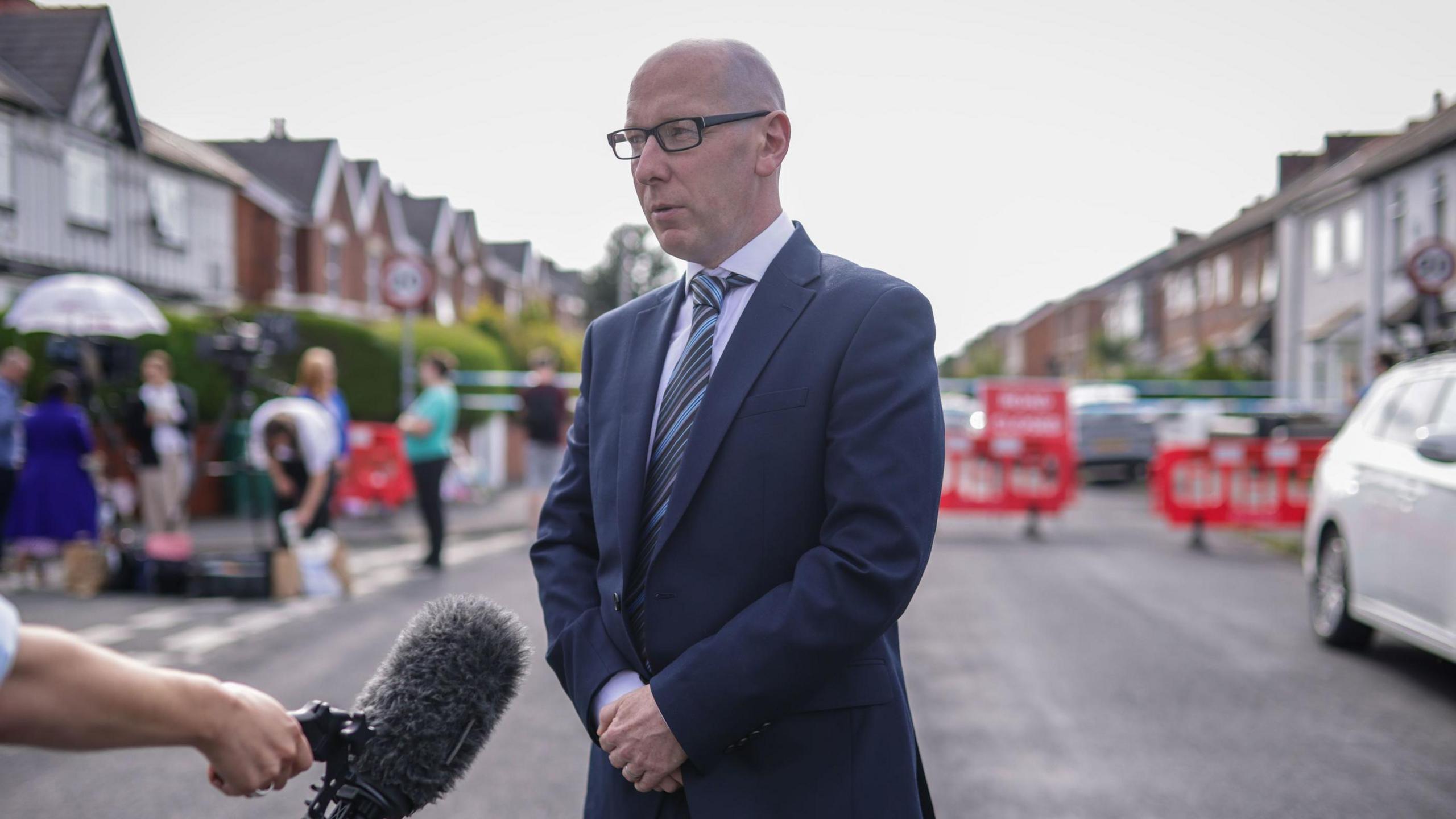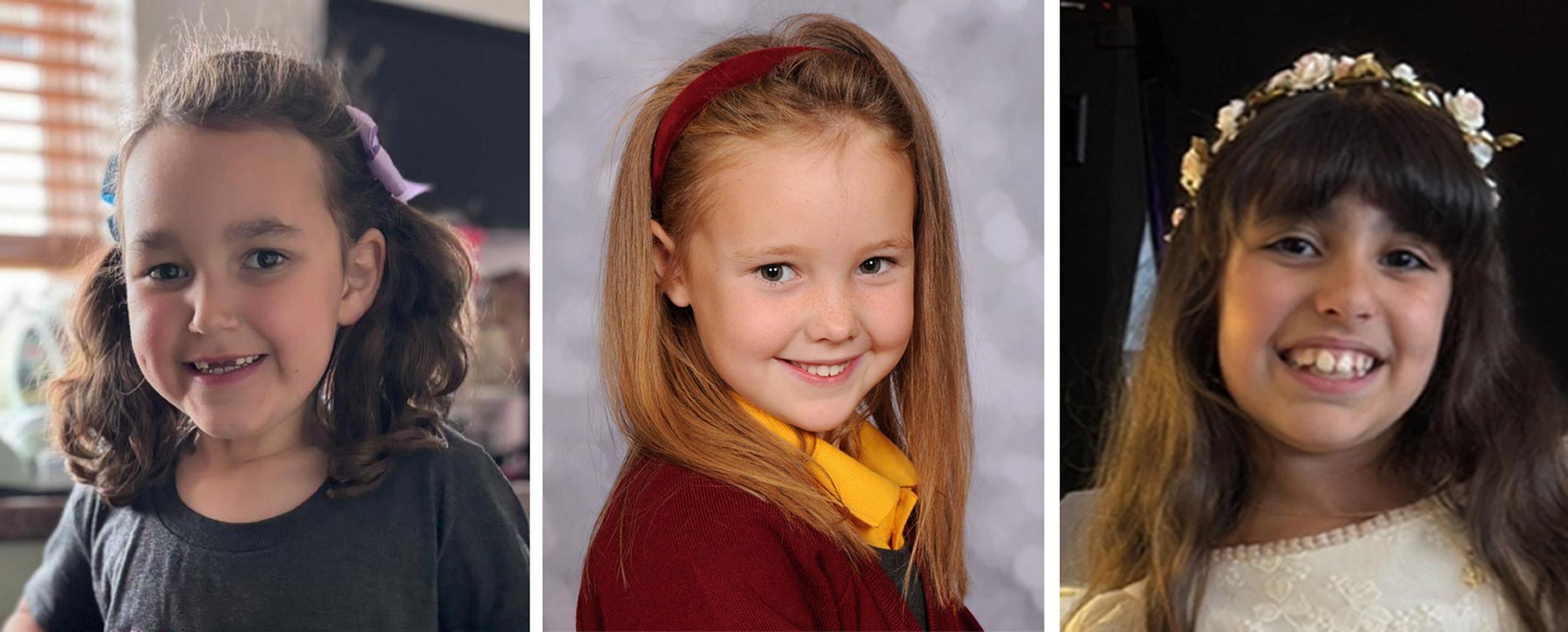MP calls for harsher sentence for Southport killer

- Published
The MP for Southport, where Axel Rudakubana murdered three young girls, has demanded a review of the killer's minimum 52-year jail sentence, arguing it is "not severe enough".
Labour's Patrick Hurley has asked the attorney general to review if the sentence was "unduly lenient" claiming it does not "reflect the crimes committed".
Rudakubana plead guilty to the murders of Elsie Dot Stancombe, seven, Bebe King, six, and Alice da Silva Aguiar, eight at a dance workshop.
The killings triggered a wave of political outrage, including from Prime Minister Sir Keir Starmer who called the attack, which wounded eight more children, "one of the most harrowing moments in our country's history".
'Terrorism has changed', says PM on Southport attacks
- Published21 January
'I knew I was running for my life': How the Southport attack unfolded
- Published23 January
How red flags over Southport killer were repeatedly missed
- Published23 January
In a statement Sir Keir said: "What happened in Southport was an atrocity and as the judge has stated, this vile offender will likely never be released."
But Hurley argued Rudakubana's sentence "is not severe enough, it is not long enough for the crimes committed".
The minimum 52-year sentence means Rudakubana cannot be considered for release until he has spent this amount of time in prison.
However, because he acted nine days shy of turning 18, by law he cannot be sentenced to a whole-life order - which would mean he could never be released from jail.
Hurley told BBC Breakfast in "exceptional circumstances" judges needed to ability to give "exceptional sentences".
He also raised concerns the surviving victims could be "retraumatised" if Rudakubana applied for parole after serving 52 years in prison, even if this was rejected.
Minister John Healey said international law prevented the UK from having a court system which imposed unlimited sentences on under-18s.
However, he told BBC Breakfast: "I can't see this man ever coming out of prison.
"I don't want to see this man ever coming out of prison and the judge yesterday when he sentenced him to 52 years was also quite clear – he does not expect him to come out of prison in the future."
Attorney General Lord Hermer and Solicitor General Lucy Rigby now have 28 days to decide, external if they will refer the sentence to the Court of Appeal.
Critics of the judge's decision would have to convince the Court of Appeal that the sentence - believed to be the second-longest minimum term ever - is not just shorter than they would have wanted, but "unduly" so.
Former Attorney General Sir Dominic Grieve said he believed the request was "hopeless" as "the chances are Rudakubana will never be released".
He told the BBC there had to be "a cut-off point" for when a whole life order could be imposed and there was evidence that younger offenders could change in a way that adults did not.
Hurley joined Conservative leader Kemi Badenoch in calling for law change to allow for whole life orders to be imposed on people aged under 18 in some cases.
Badenoch said "Rudakubana should never be released from prison" after destroying "countless lives" and sowing a "legacy of mistrust" across the country.
The Conservatives "will start to explore" how to change the law, she said.
Despite the severity of the attack the Crown Prosecution Service (CPS) decided it did not meet the legal definition of terrorism, due to a lack of evidence Rudakubana sought to advance any political, religious, or ideological agenda.
But Badenoch called the attack a "terrorist" incident, and called on others to stop "avoiding these hard truths".
Leader of Reform UK Nigel Farage demanded the CPS chief resign for failing to class the case as terrorism.
"This barbaric and senseless attack was clearly both political and ideological," Farage said.
"The British public needs to have confidence in the CPS and our police forces. Tens of millions of British citizens will find it incomprehensible how the CPS decided this was a non-terror incident and maintained that position."

Bebe King, six, Elsie Dot Stancombe, seven and Alice da Silva Aguiar, nine, died in a mass stabbing at a Taylor Swift-themed dance class in Southport
Home Secretary Yvette Cooper condemned Rudakubana's attack as "horrendous, cowardly, and evil" and said the government had pledged to hold a national inquiry.
Further details would be set out soon, she said, but added "for today, all our thoughts are with the families enduring this unimaginable pain, and the example of strength and courage they have provided to us all".
Conservative shadow home secretary Chris Philp backed the inquiry, but accused the government of overseeing an information vacuum after Rudakubana's arrest, which sparked a wave of riots across the UK last summer.
Philp is one of many critics that have accused the CPS and government of withholding key details after the attack, such as Rudakubana's three referrals to anti-extremism programme Prevent, his creation of enough ricin to kill 12,000 people and the extent of his fixation on violence and genocide.
Posting on social media, Philp said: "The prime minister and CPS could have been more open with the public. This would have avoided misinformation filling the void, and fuelling the riots.
"The inquiry must address this issue too."
Liberal Democrat leader Sir Ed Davey backed the inquiry, calling on the government to fulfil its "urgent duty to the families and our country to learn the lessons from what happened".
In response to the attack two Reform UK MPs, Rupert Lowe and Lee Anderson, called for the return of the death penalty.
Mr Lowe said it was "time for a national debate" on the use of capital punishment "in exceptional circumstances", while Mr Anderson posted a picture of a noose on his X account, with the caption: "No apologies here. This is what is required!"